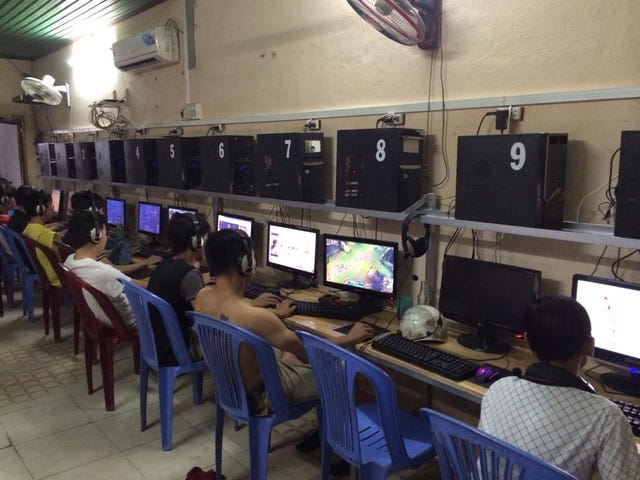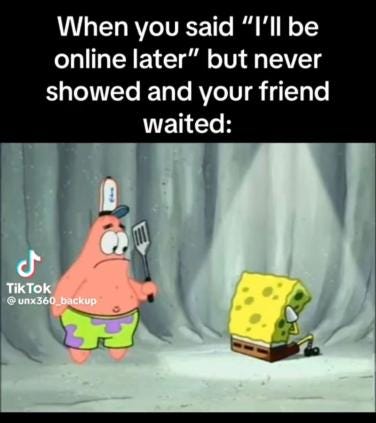Amidst this tech-saturated world, there's something peculiar lurking in the shadows of our screens, silently exerting its power.
That little green dot, innocently placed next to someone's name, beckons us to dive into the online abyss. It's a signal that they're there, waiting for a response, and it's enough to ignite an array of emotions within us.
That same green dot, besides your name and your little avatar, also shows that you’re there, and you’re an irresponsible piece of shit to not reply to them immediately.
The constant pings, the sea of messages, and those never-ending updates flood your world, making it feel like you're swimming in a digital ocean. In this fast-paced digital age, we've all been there - caught in the whirlpool of modern technology.
Have you ever felt that anxious tug, that pressure to be always available, just because that innocent green dot is staring back at you? I have a friend working remotely who has to video call her boss to talk about her work at 11 PM. The green dot syndrome has become an unwelcome companion, subtly infiltrating our lives and affecting our mental well-being in surprising ways.
So, if you've ever felt the weight of the virtual world tugging at your soul, or if you've struggled to strike a balance between being present online and cherishing the real moments, I’m with you.
the green dot syndrome
Ah, I can still vividly remember those days when being online felt like unwrapping a precious gift. As a child, my time in the digital world was a rare treat - a limited escape into a realm of games, movies, and endless wonders.
Oh, how I dreamed of the day when the shackles of time would loosen, and I could roam the vast expanse of the internet, a master of my own virtual destiny! The allure of being online all day, anytime, and anywhere was like an enchanting fairy tale, weaving dreams of unfettered exploration and boundless possibilities.
Ah, the allure of that techno-dream was sweet, but reality turned out to be a bitter awakening. Amidst the dazzling lights of constant connectivity, I find myself yearning for a taste of serenity more than ever.
The truth is, I've become entangled in this virtual web, and breaking free seems like an impossible feat. It's as if my very existence is entwined with my phone, my computer, and the fear of disconnecting feels like a precarious dance on the edge of disaster.
For the lack of better words, I suggest calling this phenomenon “the green dot syndrome”, referring to the heightened sense of connectivity and expectation that arises when we see a green dot next to someone's name, indicating their online presence.
Whether it's on messaging apps or social media platforms, the green dot can trigger various emotions, including pressure to respond immediately, fear of missing out, and the constant need to be available.
The green dot syndrome amplifies our social obligations in the digital realm. It fosters the perception that being online 24/7 is the norm, leading to feelings of guilt or inadequacy when we're not able to respond promptly. The pressure to maintain an active online presence often conflicts with the need for personal time and can negatively impact mental well-being.
Before social media, communication was a more patient and thoughtful affair. When someone left a voicemail or sent a letter, there was an unspoken understanding that responses might take some time. People respected each other's space and obligations, allowing for a relaxed and considerate exchange of messages.
However, the dynamics have drastically changed today. The omnipresent nature of instant messaging and the notorious green dots create an expectation of immediate responses. A sense of urgency now pervades our virtual interactions, leading to the feeling that we must always be on standby.
Strangely, while technology has made communication faster and more convenient, it has also instilled the pressure to be perpetually available, eroding the once-treasured art of taking time to craft thoughtful responses.
Constant exposure to the green dot syndrome can take a toll on mental health. The fear of appearing unresponsive may lead to chronic stress and anxiety, affecting sleep patterns and overall emotional balance. The constant need to be connected can lead to technology addiction, leading to a sense of detachment from the real world and strained personal relationships.
This effect is so bad, that videos like “Social media detox” used to be a trend on social media and are still relatively popular now. There’s even a Ted talk.
actionable (some things I found on Internet)
Behold, the menacing digital foes we face, but fear not, for a treasure trove of powerful solutions awaits! These mighty recommendations, carefully curated from the vast realms of the Internet, hold the key to triumph over those wicked habits that hold us captive in the virtual world.
a. the tracking wizard:
One of the most important aspects of changing a habit is to track that very habit. Call upon the tools that'll track your screen time, defeat distractions, and keep you accountable to your digital goals.
I would recommend Antisocial. I’m using it myself.
b. the time guard’s plan:
Establishing designated times for checking messages and being online can help create a healthy balance between the digital and physical worlds. Turning off notifications during specific hours can reduce the pressure to be always available.
Also openly communicate your digital boundaries with friends, family, and colleagues. Let them know when you might not be available and that delayed responses are not a sign of disinterest.
b. the mindful monk:
Recognize that it's okay to take breaks from the digital world. Engage in activities that promote relaxation, creativity, and connection with loved ones in the real world. My suggestions are:
nature's embrace:
Take a leisurely walk in the park, go hiking in the mountains, or simply lie back and stargaze under the night sky. Nature has a magical way of soothing our spirits and reminding us of life's simpler pleasures.
creative escapes:
Paint a vibrant canvas, write heartfelt poetry, or compose soul-stirring music. Engaging in these artistic pursuits allows you to express your emotions freely and tap into a wellspring of creativity beyond the digital realm.
quality time with loved ones:
Foster deeper connections with those who matter most. Plan unplugged outings with friends and family, engage in heartfelt conversations, or share laughter over a home-cooked meal.
movement:
Practice yoga, dance, or engage in any physical activity that sparks joy within you. Not only will it boost your overall well-being, but it will also foster a deeper connection with your body and emotions.
volunteer:
Participate in volunteer activities, charity events, or initiatives that uplift others. Contributing positively to the world reminds us of the impact we can make beyond the digital realm.
Let's be realistic here; I firmly believe that following every recommendation in this blog won't magically solve all your problems overnight. Life doesn't work that way. There may be valid reasons why you're constantly online, like the demands of your job, approaching project deadlines, or being there for someone who needs your support.
Acknowledging these obligations is essential to finding a balanced approach that works for you. While you explore the actionable, adapt them to your unique circumstances and focus on making gradual improvements rather than seeking instant solutions. Small steps can lead to significant change over time.
some further readings
Gen Z’s Mental Health and The Impact of Tech and Social Media
Permanently Online—Always Stressed Out? The Effects of Permanent Connectedness on Stress Experiences










My first read of your writing, and I love it. I look forward to your updates. <3
I love this writing!
I also find myself constantly swimming in the sea of information and messages. Sometimes, I have to use an app to block internet access so that I can spend one or two hours focused on work.